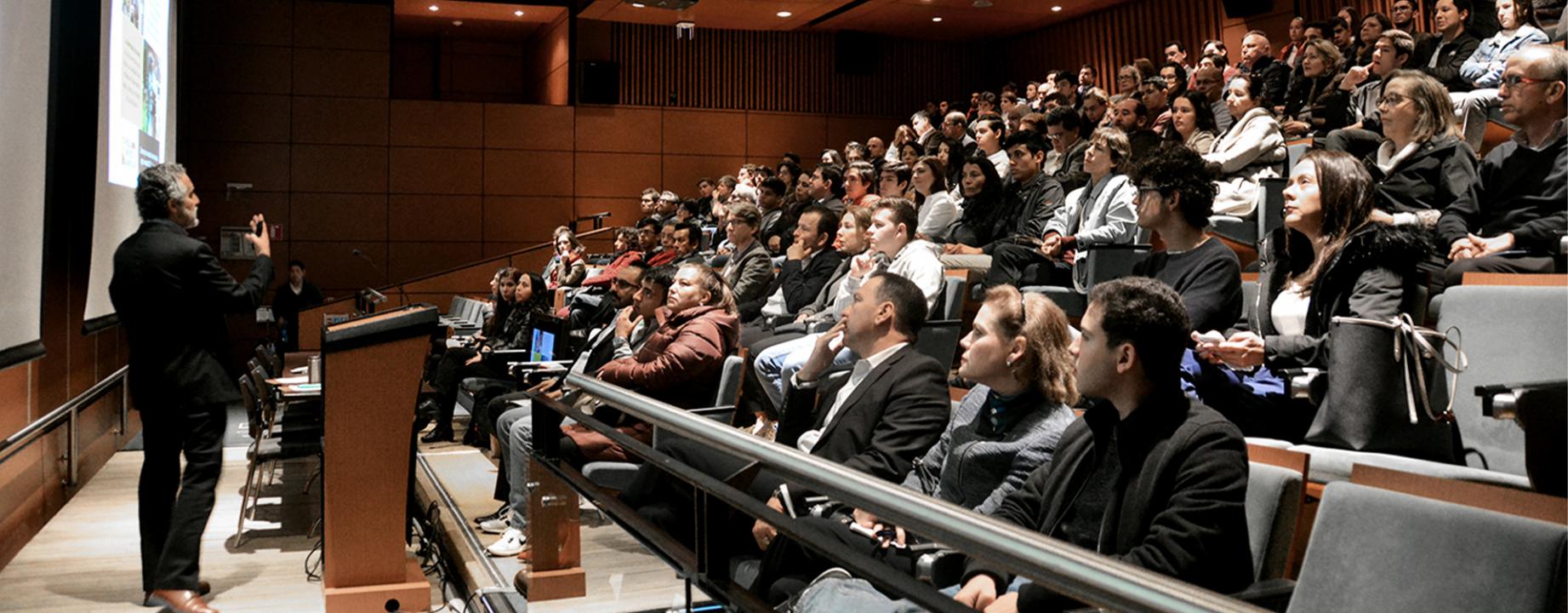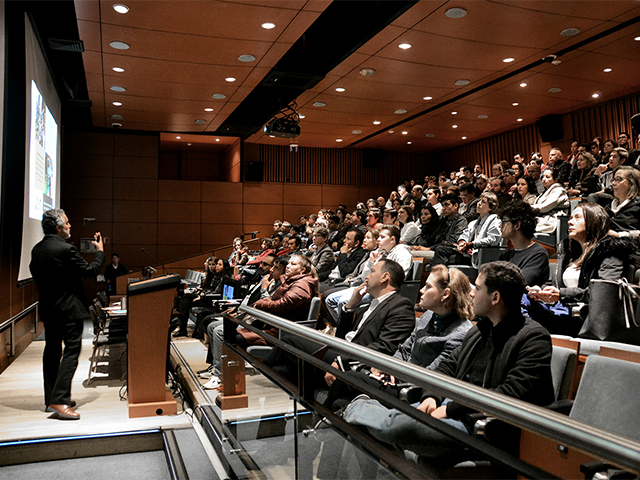| Seminario | 8-2021 |
|---|---|
| Fecha | 3 de noviembre de 2021 |
| Expositor | Kelly Jones is an Associate Professor in the Department of Human Dimensions of Natural Resources at Colorado State University (CSU). She applies microeconomic theory and methods to understand relationships between people, policy, and the environment. Specific areas of interest include market-based conservation, forest and water conservation, and evidence based conservation. She has active research projects in Colombia, Ecuador, Mexico and the western United States. |
| Lugar | Virtual. |
| Hora | 1:00 a 2:00 p.m. |
| Ver | Enlace |
| Seminario | 7-2021 |
|---|---|
| Fecha | 6 de octubre de 2021 |
| Expositor | Alex Pfaff is a Professor of Public Policy, Economics and Environment at Duke University. He studies how economic development affects, and is affected by, natural resources and the environment. His focus is on the impacts of conservation policies and development policies on land use, water quantity and quality, exposures. and the provision and use of information. |
| Lugar | Virtual. |
| Hora | 1:00 a 2:00 p.m. |
| Ver | Enlace |
| Seminario | 6-2021 |
|---|---|
| Fecha | 11 de agosto de 2021 |
| Expositor | Paulina Oliva Associate Professor of Economics and Spatial Sciences in the Dornsife College of Letters, Arts and Sciences at the University of Southern California. |
| Lugar | Virtual. |
| Hora | 1:00 a 2:00 p.m. |
| Ver | Enlace |
| Seminario | 5-2021 |
|---|---|
| Fecha | 22 de julio de 2021 |
| Expositor | Sandra Aguilar-Gómez is an incoming postdoctoral scholar at the Center for Global Transformation (CGT) at UC San Diego, and next year (Fall 2022), she will join Universidad de Los Andes as an Assistant Professor of Economics. She holds a Ph.D. in Sustainable Development from Columbia University. Her main research interests focus on understanding the consequences of environmental change and the challenges governments face in implementing policies in contexts with underlying structural inequalities or weak institutions. Likewise, she also conducts research in gender issues for developing countries. |
| Resumen | Does natural resource-led industrial specialization affect women's roles in society, and do such roles persist over time, even as the initial conditions are gone? We explore the Gold Rush in Western United States in the late 19th-century as a natural experiment to answer these questions. We use a geographic difference-in-difference methodology, exploiting the location and discovery of gold deposits and their influence on sex ratios, to understand short-term and persistent changes in labor and marriage markets. Gold mining, through the oversupply of marriageable men with income, increased (decreased) marriage rates among women (men). Women married older men, and fewer women entered the labor markets. In parallel, the Gold Rush created a market-based service sector economy for women. The initial service sector boom rapidly disappeared with the gold, leaving persistent, depressed labor force participation of women and strong marriage norms in its wake. |
| Lugar | Virtual. |
| Hora | 8:00 a 9:00 a.m. |
| Ver | Enlace |
| Seminario | 4-2021 |
|---|---|
| Fecha | 7 de julio de 2021 |
| Expositor | Allen Blackman Principal Economic Advisor to the Climate and Sustainable Development sector at the Inter-American Development Bank and Nonresident Fellow at Resources for the Future. |
| Resumen | Chronic severe air pollution in Bogotá, Colombia has serious human health impacts. Using digital technologies to disseminate information about air quality may enable citizens to reduce their exposure to air pollution by, for example, avoiding outdoor exercise on certain days an in certain locations, and may also help change their environmental attitudes and policy preferences. To investigate these linkages, we conducted a randomized controlled trial to assess the effectiveness of a bundled informational treatment—including training in the use of a newly launched smartphone application called Aire Bogotá that displays near-real-time spatial information on air quality—on more than 550 university students’ acquisition of air quality information, knowledge about avoidance behavior, actual avoidance behavior, dissemination of environmental information, and attitudes about the environment. We find that the treatment led to substantial changes in five of our six categories of outcomes. |
| Lugar | Virtual. |
| Hora | 1:00 a 2:00 p.m. |
| Ver | Enlace |
| Seminario | 3-2021 |
|---|---|
| Fecha | 2 de junio de 2021 |
| Expositor | Juan Robalino Director of the Institute of Economic Research and a professor at the Department of Economics at the University of Costa Rica. |
| Lugar | Virtual. |
| Hora | 1:00 a 2:00 p.m. |
| Ver | Enlace |
| Seminario | 2-2021 |
|---|---|
| Fecha | 7 de abril de 2021 |
| Expositor | Anna Nordén Assistant Professor in Economics at Jönköping International Business School (JIBS), Jönköping University. |
| Resumen | Amid growing emphasis on community-based approaches to natural resource management, there are concerns about the lack of women participation in communal decision-making. We analyze the association between participation of women in decision-making of forest user groups and several forest management outcomes. We combine longitudinal survey, administrative and forest inventory data and find that active participation of women (representation on the executive committee) is associated with greater forest benefits, and an improved (perceived and actual) condition of the forest. The association between (passive) women participation in group-level meetings and outcomes is not robust across alternative models. Using experimental data on alternative governance modalities, we also find that external (i.e. top-down) monitoring by the government increases women leadership at the group level. |
| Lugar | Virtual. |
| Hora | 10:00 a 11:00 a.m. |
| Ver | Enlace |
| Seminario | 1-2021 |
|---|---|
| Fecha | 3 de marzo de 2021 |
| Expositor | Francisco Alpízar Chair, Environmental Economics and Natural Resource Group (ENR). |
| Lugar | Virtual. |
| Hora | 1:00 a 2:00 p.m. |
| Ver | Enlace |

